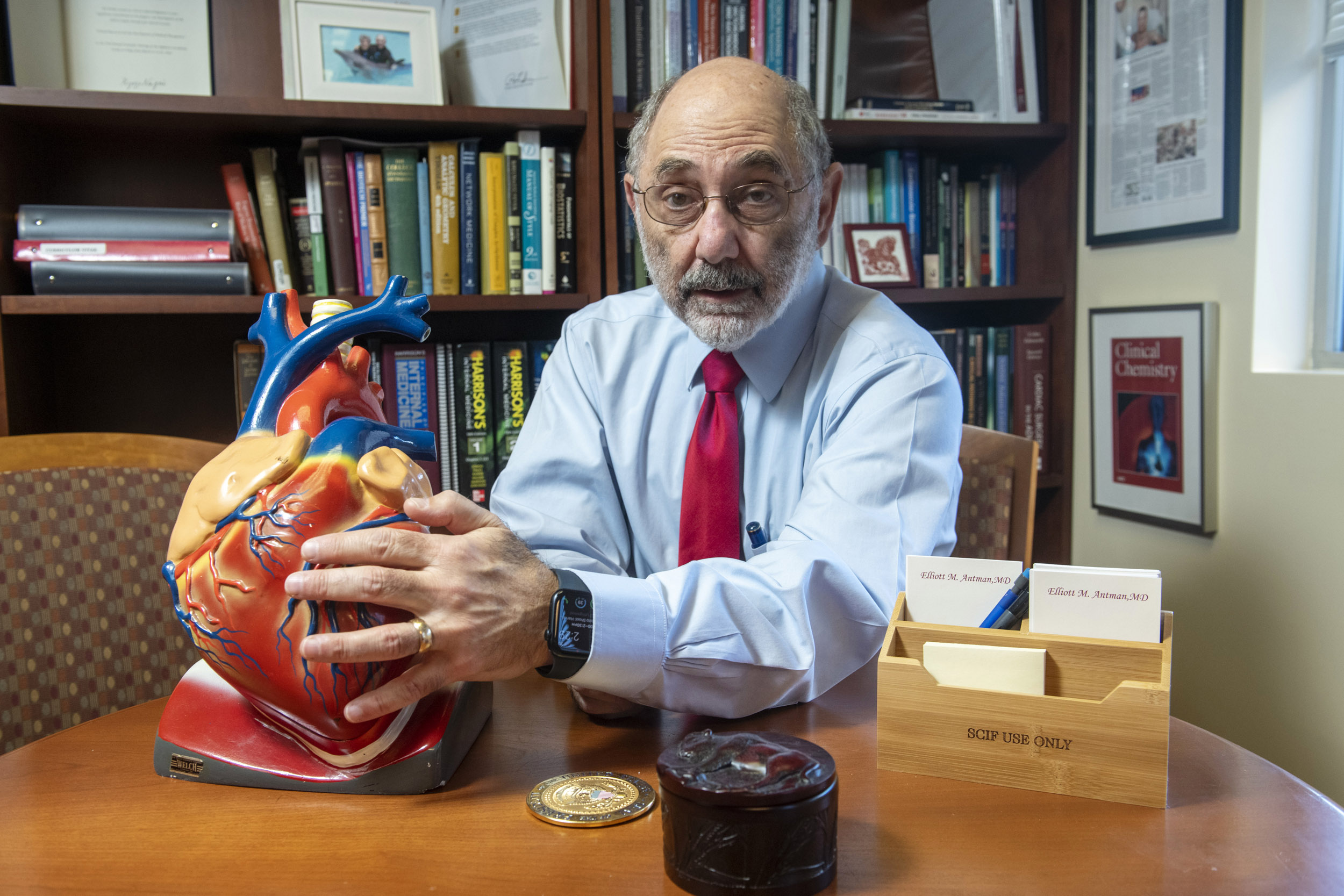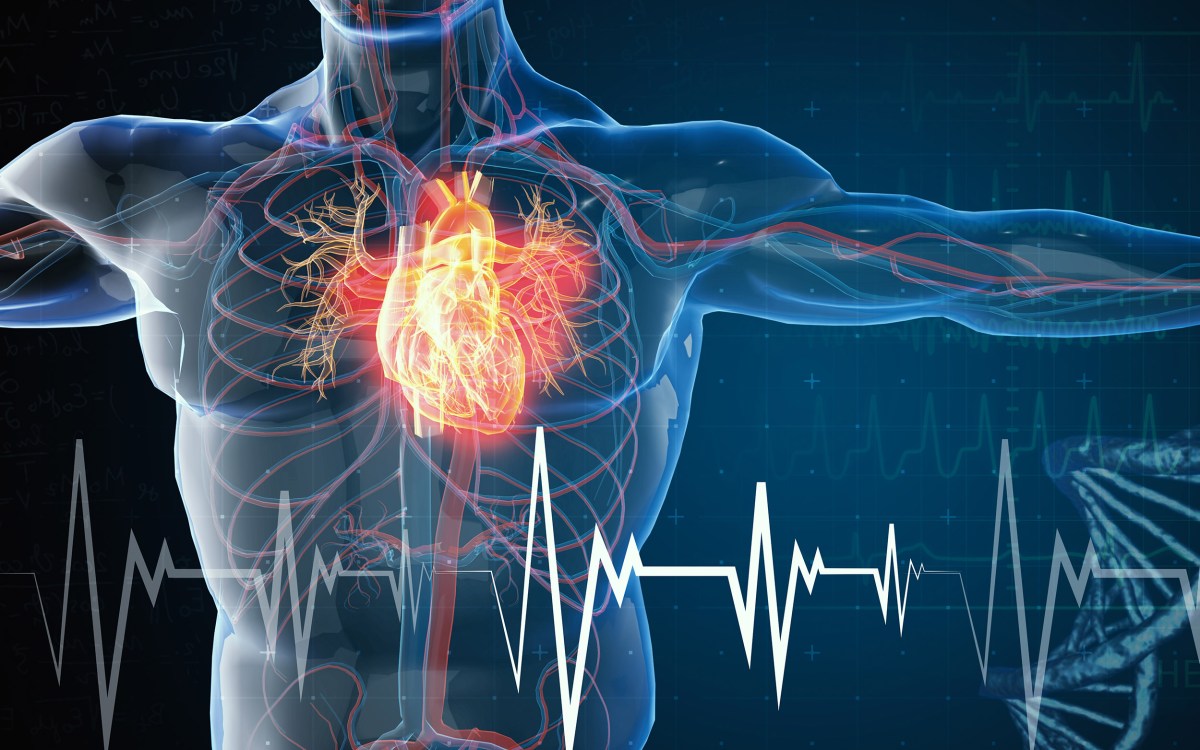
Brigham and Women’s doctor Elliott Marshall Antman explains why cardiac risk rises during the holidays and details the warning signs.
Jon Chase/Harvard Staff Photographer
It’s heart attack season
Specialist says stress, medication lapses contribute to holiday jump in cardiac mortality
Along with parties, travel, and stress, fatal heart attacks are more common in December. We asked Elliott Marshall Antman, a specialist in cardiovascular medicine at Brigham and Women’s Hospital and a professor at Harvard Medical School, to expand on why — and to describe the warning signs. The interview has been edited for clarity and length.
Q&A
Elliott Marshall Antman
GAZETTE: Why do heart attacks and cardiovascular problems rise during the holidays?
ANTMAN: The increase almost certainly reflects a change in an individual’s usual state. That is, if they’re taking medications that are controlling their cardiovascular condition, going into the holidays their schedule may change; they may travel and they may not be taking their medications as reliably as they were before the holidays. Another possibility is that the holiday period for many individuals is a period of stress. There’s concern about travel, particularly in the current situation, with respiratory illness worries. There may be social stresses that individuals experience, as they approach the holiday season, that can increase their blood pressure and their heart rate, and those physiologic responses can provoke an imbalance of the blood supply to the heart muscle. The demands at that point are high on the heart muscle and so a heart attack can occur. For any individual person, it may be a variety of circumstances. And we cannot say that it is the same set of circumstances from person to person.
GAZETTE: Can you talk more about the impact of stress?
ANTMAN: Stressful circumstances can produce three physiologic reactions, which converge on a patient’s heart and the arteries that bring blood to it. First, the heart rate can increase in response to stress. Second, the blood pressure can also increase in response to stress. And the third is that the release of substances like adrenaline can cause the coronary arteries to constrict, further limiting the flow that comes through those arteries, which are responsible for bringing blood to the heart muscle. Through one or more of these physiologic responses, an individual could be at risk for a disturbance of the balance between blood supply and demand. But when we talk about stress, the physiologic response to stress can result from good emotions or bad emotions. The cardiovascular system will do the same thing.
GAZETTE: What are the cardiovascular warning signs people should be aware of?
ANTMAN: Individuals who are having a problem with blood supply to their heart muscle typically develop some discomfort — often in the center of the chest, but it may radiate to the neck, to the jaw, to the shoulders, or down the arms. Typically, it is not at its most intense level when it begins, but it builds to a peak, and then when it goes away, it gradually goes away, as opposed to turning a light off.
Sometimes, the discomfort is associated with a sense of nausea, sweating, lightheadedness, palpitations. These are warning signs to an individual that something could be wrong with the balance of blood supply and demand to their heart muscle. If this lasts more than 10 minutes, an individual should consider seeking medical attention. Many people who are experiencing heart attack have discomfort that lasts 20 minutes or more. Seeking medical attention is the best way to have this evaluated. We don’t want patients to experiment at home by taking antacids and thinking that will just take care of the problem; we want them to present to the medical health care system as promptly as possible, and often that means calling 911. I recognize that emergency departments are full because of many other illnesses that are affecting our communities. But that is not a reason to avoid seeking medical attention for new or worsening cardiovascular symptoms.
It’s possible to be having a heart attack that presents with symptoms affecting only a part of the body that’s distant from the chest. And we should remember that some people, particularly elderly patients or those who have diabetes, when they have a heart attack, they may not have discomfort, but feel fatigued or short of breath or find themselves sweating a lot more than they’re used to. We need to be alert to those symptoms as well.








